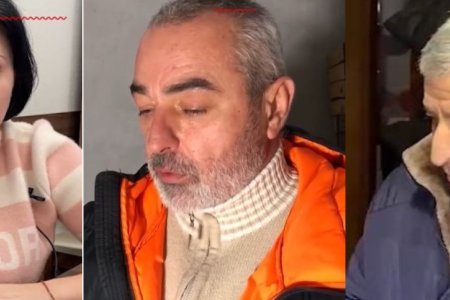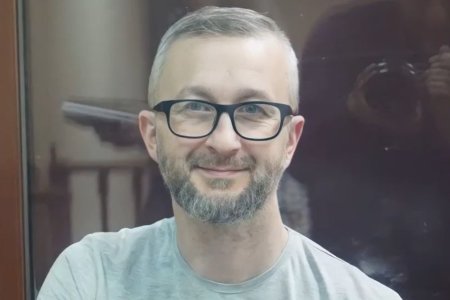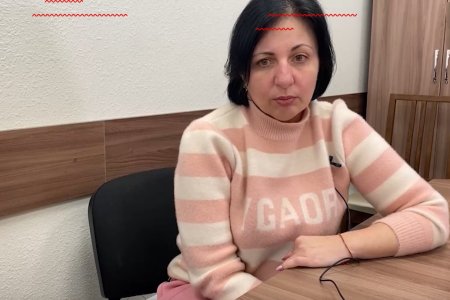
The ‘trial’ is shortly to begin in a Russian court of 74-year-old Ukrainian civic activist Volodymyr Ananiev, together with a couple possibly abducted from occupied Zaporizhzhia oblast. There is nothing to suggest that Ananiev had ever set eyes on Volodymyr Bodnar and Oksana Shevchenko, whom the Russian propaganda media call a couple and it is quite likely that all three were seized at different times and then forced, probably through torture, to take part in stated arrests.
Ananiev already had health issues when seized by the FSB in occupied Crimea on 2 February 2024 and can even be seen on the FSB propaganda videos walking with the help of a stick, due to problems with his knee joint. His wife reports that he has high blood pressure, spinal problems, hernias and has undergone glaucoma and other eye operations. He needs medication on a daily basis, which he is doubtless not receiving.
Although Ananiev is well-known as a civic activist and publicist in Crimea, he seems to have been living in Kyiv with his wife, Hanna Sviatnenko, who is a university lecturer. Suspilne Crimea has spoken with Hanna, who explains that her husband had set off for Crimea to sort out some personal matters in the autumn of 2023, and was staying with a friend. She was in constant contact with him.
That contact broke off on 2 February 2024 when her husband did not ring. It was only later that she found out from the friend that the FSB had turned up on 2 February and taken Ananiev away.
It was only on 5 February that reports appeared in the Russian propaganda media citing the FSB as claiming that they had ‘thwarted’ plans to carry out a ‘terrorist attack’ with Ananiev shown on the FSB video as one of the alleged ‘plotters’. That same day, Ananiev was formally charged and remanded in custody.
That leaves three days in Ananiev’s case when he was held by the FSB incommunicado and without any procedural status at all. It is likely that Bodnar and, perhaps, Shevchenko were held under total FSB control, without contact with a proper lawyer for even longer. It is precisely during such periods of isolation that detainees are typically shown on videos supposedly ‘confessing’ to whatever charges the FSB are laying. In virtually all cases where a person later receives access to an independent lawyer, they retract such ‘testimony’ and describe the torture used to extract it.
As reported, the FSB simply claimed that they had arrested three people – Ananiev; Volodymyr Bodnar and Oksana Shevchenko. The latter two are known to have been living in occupied Zaporizhzhia oblast, making it physically impossible that they could have been in ‘a terrorist group’ together with Ananiev, who was based in Kyiv. The FSB, however, claimed, with its customary disregard for the presumption of innocence that the three had been ‘a group’ which was, on directions from Ukraine’s Security Service [SBU] planning to blow up a car , The FSB was, in short, claiming yet again to have ‘thwarted an SBU terrorist attack against one of the leaders of Crimea”. And, once again, the only ‘evidence’ of such a purported plan came from videoed ‘confessions’ clearly obtained while the alleged ‘plotters’ were totally under FSB control.
Although there was no attempt to blur the detainees’ faces, they were all initially referred to only by surname and initials, and as ‘Russian citizens’. Russia has made it impossible to live, receive medical care, keep ones property, etc. on occupied territory without a Russian passport. Even if the three do all have Russian passports, there are no grounds for assuming these to be any more voluntary than the ‘confessions’ which all are claimed to have given.
In fact, only Volodymyr Bodnar’s ‘confession’ was shown, with the Ukrainian faltering at one point, as though trying to remember what he should say. The rest of his speech was so smooth as to suggest that he had, indeed, been forced to learn it off by heart. He said that he was born in Zaporizhzhia on 12 April 1974 and is registered in that city. He was supposedly told by SBU officers to take “an explosive device of American or German make” to Melitopol which he allegedly did. He claims that he cut a hole out of a gas cannister and placed what he calls ‘a mine’ in it, wrapped this in a rag and carried it to Crimea. While Zaporizhzhia is under government control, both Melitopol and Crimea are under occupation. This, at very least, raises questions about how he could have got through border controls with such an explosive device. At least one of the propaganda reports cited Shevchenko as saying that her husband had taken the explosive device to occupied Crimea back in May 2023 and hidden it in a rented garage. Then in October 2023, he purportedly received SBU instructions to detonate the device near one of the cars in the cortege of one of the leaders of Crimea. They were purportedly planning to carry this out from 26 January to 1 February 2024 but were detained by the FSB.
This rather begs the issue of why Ananiev was seized since, for the first ten months, he was accused only of ‘the illegal purchase, transfer, sale, possession or movement of explosive devices’ under Article 222.1 § 1 of Russia’s criminal code. In November 2024, however, a second charge was added of abetting in the planning of ‘a terrorist attack’ (Article 205.1). Bodnar and Shevchenko are charged under Article 205 § 2 a, (and Article 30 § 1) ‘an attempt to commit an act of terrorism’, as well as Article 222.1 § 3a.
All three Ukrainians were added to Russia’s notorious ‘Register of terrorists and extremists’ in July 2024. Their ‘trial’ is to take place at the Southern District Military Court, which has been handed down monstrous sentences against Ukrainian political prisoners since soon after Russia’s invasion of Crimea All face very long sentences, with no proof that there ever was such a plan to blow up “a Crimean leader”, let alone that they were involved.
Aside from the above details given by Volodymyr Bodnar (b. 1974) and Oksana Shevchenko’s reported age (45), nothing much is known of the couple. Suspilne Crimea writes that they were unable to contact the couple’s families. The Crimean Human Rights Group [CHRG] has reported that Shevchenko was held prisoner at SIZO No. 2 in occupied Simferopol, one of two remand prisons opened soon after Russia’s full-scale invasion of Ukraine. In pointing to the many indications that this case is fabricated, Olha Skrypnyk, Head of CHRG, noted the minimal possibility that Ananiev knew Bodnar and Shevchenko. Ananiev is not a young man, she added, and did not use most of the Messenger platforms, making it quite unclear how the three were supposed to have ‘plotted’ together. You get the impression, she says, that the FSB were not, themselves, clear what to accuse Ananiev of, with him held for a few days without any status while they fabricated charges. Even without physical forms of torture, the FSB could have put massive pressure on the 75-year-old by refusing to provide critically needed medical care. Such deliberate failure to provide medical care in order to extract confessions is classified by Article 3 of the European Convention on Human Rights as torture.
Volodymyr Ananiev and his wife have been together for 30 years, and he also has a son and daughter, as well as grandchildren, from his first marriage. In Crimea, he had engaged in civic activism, helping people protect their right to their land. Refat Chubarov, Head of the Mejlis, or representative assembly of the Crimean Tatar people, referred to Ananiev as a person for whom justice is paramount. He was concerned to ensure just and honest privatization of land in Crimea, including for Crimean Tatars. He searched for solutions for Crimean Tatars who returned to their homeland after decades of forced exile (following the 1944 Deportation) and who had been left without land of their own.
Andriy Shchekun, a civic activist forced into exile after being abducted and tortured in the first weeks after Russia’s invasion, has known Ananiev since 1999 and recalls the crucial role Ananiev played in helping people, including Shchekun’s own father-in-law, to defend their right to their land. He says that, at that time, Volodymyr “was a breath of freedom for people who had worked hard on the land. They were grateful for such support, and felt that they were not alone.”.
Ananiev is reported to have also provided support for believers of the Orthodox Church of Ukraine and to have published publicist works.
It is quite possible that such a clear active position was the real reason the 75-year-old was targeted by Russia’s FSB, effectively tortured and is facing a sentence he could not possibly survive.



